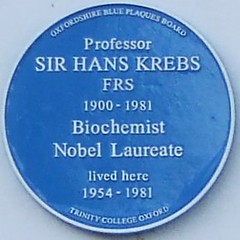Sir Hans Krebs FRS


Sir Hans Krebs FRS
(1900-1981)
biochemist, Fellow of the Royal Society, Nobel Physiology or Medicine Laureate (from 1953), and Knight Bachelor (from 1958)
Commemorated on 2 plaques
Professor Sir Hans Krebs FRS (1900-1981), biochemist, Nobel laureate, lived here (1954-1981)
27 Abberbury Road, Iffley, Oxford, United Kingdom where they lived
Professor Sir Hans Krebs FRS 1900-1981 biochemist & discoverer of the Krebs cycle. Nobel Prize Winner 1953 worked here 1954-1967
Krebs Building, Department of Biochemistry, Oxford University, Oxford, United Kingdom where they worked


